Togo, a biodiverse country in West Africa, is home to various ecosystems and endemic species. However, the biodiversity in Togo faces challenges such as ecosystem degradation and the absence of a fauna monitoring system. It is crucial to conserve Togo’s unique flora and fauna for sustainable development. Efforts are being made to achieve the Aichi Biodiversity Targets and preserve Togo’s natural resources, which provide numerous benefits to local communities and the economy.
Key Takeaways:
- Togo’s biodiversity is under threat from ecosystem degradation and the lack of a fauna monitoring system.
- Conservation efforts are vital to protect Togo’s unique flora and fauna and ensure sustainable development.
- Efforts are being made to achieve the Aichi Biodiversity Targets and preserve Togo’s natural resources.
- Togo’s biodiversity provides numerous benefits to local communities and the economy.
- Togo is committed to preserving its biodiversity and achieving sustainable development.
Togo’s Terrestrial Flora and Aquatic Species
Togo, located in West Africa, is renowned for its rich biodiversity, encompassing not only terrestrial flora but also a thriving aquatic ecosystem. The country is a treasure trove of diverse plant life, including an array of flowering plants, tropical fruits, medicinal herbs, orchids, grasses, and ferns.
Furthermore, Togo’s aquatic habitats are teeming with life, housing various species of fish, amphibians, crustaceans, waterbirds, and aquatic plants. The combination of terrestrial flora and aquatic species in Togo contributes significantly to the country’s rich biodiversity and botanical heritage, making it a hotbed for biodiversity research.
Researchers studying Togo’s flora and fauna have made remarkable discoveries, unveiling new species and advancing our understanding of the country’s ecological wealth. Through rigorous biodiversity research efforts, Togo has become a hub for botanical exploration and conservation, safeguarding its natural resources and showcasing its commitment to preserving its unique biodiversity.
Protecting Togo’s Terrestrial Flora and Aquatic Species
The conservation of Togo’s terrestrial flora and aquatic species is of paramount importance to ensure their survival. Efforts aimed at preserving these vital components of Togo’s biodiversity involve various steps:
- Strengthening the protection of endangered plant species and implementing measures to mitigate their decline.
- Establishing protected areas to safeguard crucial habitats and promote conservation efforts.
- Encouraging sustainable land management practices to minimize the impact of human activities on Togo’s flora and fauna.
- Engaging in community-based conservation initiatives to promote awareness and involve local communities in protecting Togo’s biodiversity.
- Supporting research and monitoring programs focused on Togo’s terrestrial flora and aquatic species to enhance the understanding of their ecological roles and conservation needs.
By undertaking these conservation actions, Togo can ensure the continued existence of its terrestrial flora and aquatic species, maintaining its botanical heritage and promoting sustainable development.
“Togo’s diverse terrestrial flora and thriving aquatic ecosystems are invaluable assets that require our unwavering commitment to conservation. Protecting and preserving these natural wonders not only benefits our environment but also contributes to the cultural and economic well-being of our nation.” – Dr. Marie Konu, Botanist
Togo’s commitment to conserving its terrestrial flora and aquatic species serves as a testament to its dedication towards ensuring a sustainable and biodiverse future. By valuing and protecting its botanical heritage, Togo sets an example for other nations to follow in their endeavors to safeguard the world’s biodiversity.
Togo’s Animal Species
Togo is a biodiverse country with an abundance of animal species, including mammals, birds, reptiles, amphibians, and insects. Extensive research conducted in Togo has not only aided in the identification of new species but also enhanced our understanding of the distribution and conservation status of existing ones. Togo’s rich biodiversity is a result of its diverse ecosystems, ranging from savannas and forests to wetlands and coastal areas.
Researchers and conservationists in Togo are dedicated to studying and protecting the country’s animal species through ongoing biodiversity research and conservation efforts. The research conducted provides valuable insights into the behavior, habitat preferences, and ecological roles of Togo’s animal species.
Endangered animal species in Togo face various threats, including habitat loss, pollution, climate change, and poaching. These species require urgent conservation efforts to protect their populations and prevent their extinction.
Biodiversity Research in Togo
The extensive biodiversity research conducted in Togo has significantly contributed to our understanding of the country’s animal species. Researchers have documented new species, clarified taxonomic classifications, and identified areas of high biodiversity value that require conservation attention.
Research conducted by Dr. Kofi Mensah, a renowned zoologist from the University of Togo, has shed light on the ecological importance of Togo’s forests in supporting diverse mammal and bird populations. He discovered several endangered animal species previously unknown to science, emphasizing the need for urgent conservation measures to protect their habitats.
Moreover, Togo’s National Park System plays a vital role in biodiversity research and conservation efforts. These protected areas provide crucial habitats for numerous animal species, enabling researchers to study their behaviors, breeding patterns, and migration routes.
Conservation Efforts in Togo
Togo recognizes the importance of conserving its animal species and has implemented various initiatives to protect and preserve its biodiversity. The Ministry of Environment and Forest Resources, in collaboration with local and international organizations, has established conservation programs aimed at safeguarding endangered animal species and their habitats.
- The creation of protected areas, such as Fazao-Malfakassa National Park and Togodo Integral Nature Reserve, ensures the preservation of critical habitats for endangered animal species.
- Community-based conservation projects involve local communities in sustainable wildlife management and encourage their participation in conservation efforts.
- Educational programs and awareness campaigns raise public awareness about the importance of biodiversity conservation and encourage responsible behavior towards wildlife.
By combining research, conservation efforts, and community involvement, Togo aims to protect its animal species and ensure the long-term survival of its biodiversity.
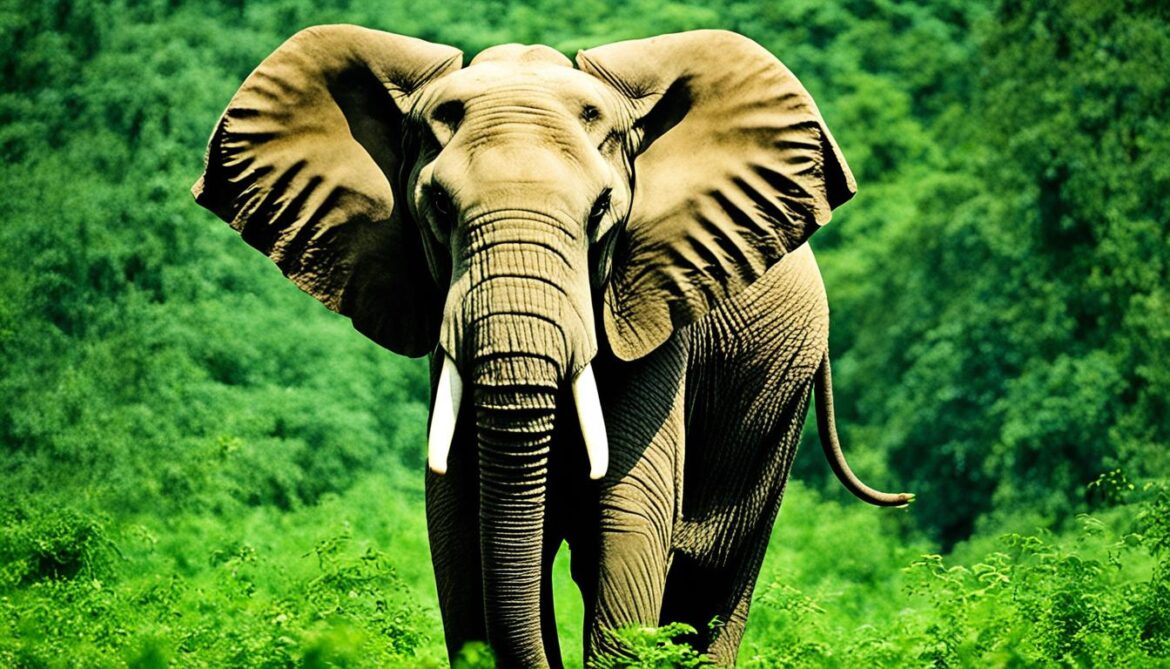
| Endangered Animal Species |
Conservation Status |
| West African Chimpanzee |
Critically Endangered |
| Togo Slippery Frog |
Endangered |
| Red-bellied Monkey |
Vulnerable |
| African Elephant |
Vulnerable |
| Golden Frog |
Endangered |
Forest Fragmentation and Land Use Changes
Land use changes, such as deforestation, have led to significant forest fragmentation in Togo, particularly in the northern region of the country. This fragmentation has disrupted habitats, posing a grave threat to the survival of numerous species. Fragmented forests provide fewer resources and limited connectivity, making it increasingly challenging for wildlife to move and reproduce.
The loss of forest cover contributes to the degradation of the ecosystem, reducing the availability of food, shelter, and nesting sites for countless species. The effects of habitat disruption reverberate throughout Togo’s biodiversity, impacting the delicate balance of its ecosystems.
“The fragmentation of forests has a direct and detrimental impact on the biodiversity of Togo. As habitats are disrupted, species struggle to find suitable resources and are confined to smaller areas. This isolates populations, making them more vulnerable to extinction.”
Togo’s diverse flora and fauna rely on intact and contiguous habitats to thrive. However, the impacts of forest fragmentation and land use changes compromise the survivability and resilience of numerous species, aggravating the ongoing decline in biodiversity.
To mitigate the loss of biodiversity in Togo, sustainable land management practices and conservation efforts are imperative. By implementing responsible land use policies, promoting reforestation, and establishing protected areas, Togo can help restore fragmented habitats and safeguard its unique and valuable biodiversity.
By raising awareness about the environmental consequences of forest fragmentation and encouraging sustainable practices, Togo can foster a harmonious coexistence between human development and biodiversity conservation.

| Effects of Forest Fragmentation and Land Use Changes |
Impacts on Biodiversity |
| Loss of habitat connectivity |
Disruption of species’ movements, migration, and genetic flow |
| Reduced resource availability |
Decline in food sources, shelter, and nesting sites |
| Increased vulnerability to extinction |
Isolation of populations and reduced genetic diversity |
| Ecological imbalance |
Disruption of ecosystem services and interactions |
Benefits of Togo’s Biodiversity
Togo’s biodiversity provides a multitude of benefits to its people, encompassing a wide range of food products, raw materials for industry, and sociocultural significance.
Food Security and Nutrition
One of the key advantages of Togo’s biodiversity is its contribution to food security and nutrition. The diverse flora and fauna offer a variety of indigenous crops and wild edibles that significantly enrich the local diet. By incorporating a diverse range of food sources, Togo’s biodiversity ensures that communities have access to a well-rounded and nutritious diet, reducing the risk of malnutrition.
Raw Materials for Industry
Togo’s forests are a valuable source of raw materials for various industries. Timber extracted sustainably from these forests is used in construction and furniture manufacturing, supporting economic growth while maintaining the country’s rich biodiversity. The availability of abundant raw materials enables Togo to reduce its reliance on imports and promote local entrepreneurship.
Sociocultural Significance
The plants and animals in Togo hold immense sociocultural significance within local communities. Many Togolese rely on traditional pharmacopeia, utilizing the medicinal properties of plants and herbs for healing and wellness. These indigenous knowledge systems are deeply rooted in cultural practices and are an integral part of Togo’s heritage. Additionally, specific plants are used in traditional rites and ceremonies, reinforcing the cultural fabric of the nation.
“Togo’s biodiversity is not only essential for sustenance and economic development but also plays a crucial role in preserving sociocultural traditions and maintaining a sense of cultural identity.”
In conclusion, Togo’s biodiversity offers countless benefits, ranging from food security and raw materials for industry to preserving sociocultural traditions. The diverse flora and fauna in Togo contribute to a sustainable and resilient society by promoting healthy diets, supporting local industry, and preserving cultural heritage.
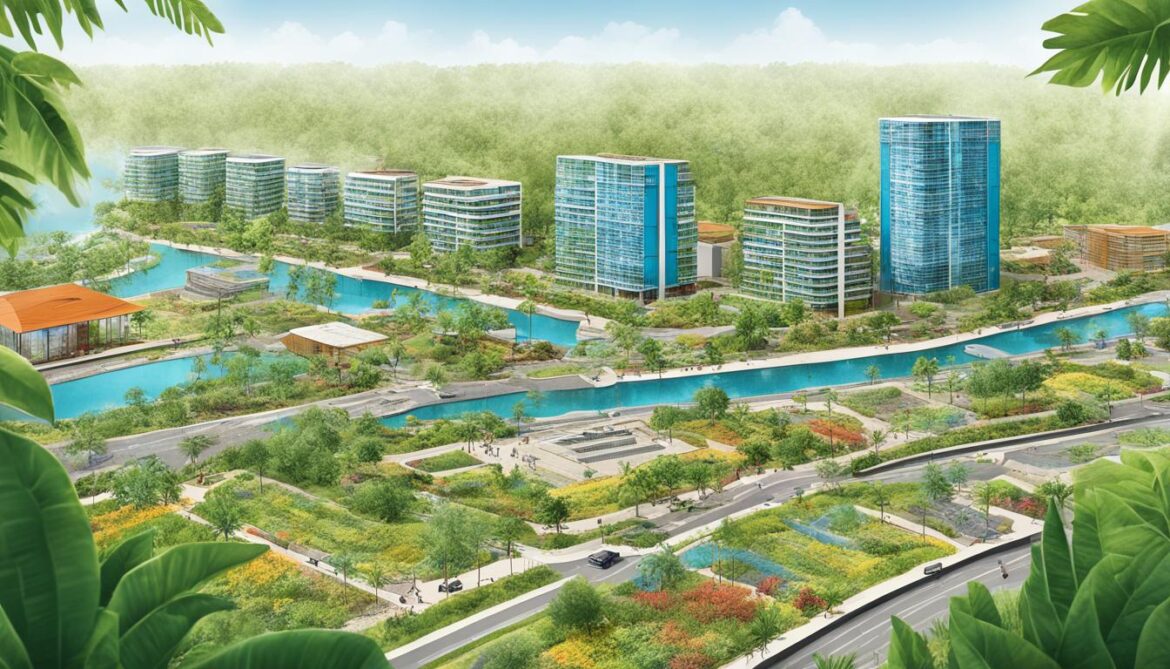
Advancing Sustainable Architecture Through Beekeeping
In its commitment to sustainable development, UNESCO has implemented a project in Togo that focuses on developing sustainable livelihoods. One fascinating aspect of this initiative is the integration of beekeeping, which not only supports sustainable architecture and eco-friendly construction practices but also provides numerous benefits for local communities.
Beekeeping plays a vital role in promoting sustainable architecture and eco-friendly construction in Togo. Firstly, it supports sustainable livelihoods by offering a source of income for beekeepers. By producing honey and other bee-related products, beekeepers can generate economic opportunities while contributing to the preservation of local ecosystems.
Secondly, beekeeping contributes to the preservation of local biodiversity. Bees are important pollinators, playing a crucial role in the reproduction of plants and the maintenance of healthy ecosystems. Their presence helps maintain the balance in ecosystems by aiding in the reproduction of flowering plant species.
Furthermore, beekeeping promotes eco-friendly practices. Unlike conventional agriculture, which often relies on pesticides and chemical fertilizers, beekeeping is a more environmentally friendly practice. By encouraging natural pollination and reducing chemical inputs, beekeeping helps minimize the negative impact on the environment.
Lastly, beekeeping can help in reducing conflicts between human settlements and wildlife. As human settlements expand, clashes between humans and wildlife become more frequent. However, by providing bees with suitable habitats and encouraging their presence in specific areas, beekeepers can help divert wildlife from human settlements, reducing conflicts and promoting harmonious coexistence.
In summary, beekeeping is a valuable component of Togo’s sustainable architecture and eco-friendly construction practices. By contributing to sustainable livelihoods, preserving local biodiversity, promoting eco-friendly practices, and reducing conflicts between human settlements and wildlife, beekeeping showcases the potential for innovative and environmentally conscious solutions in Togo’s journey towards sustainability.
Green Livelihoods and Value Addition to Shea Nuts
UNESCO has recognized the importance of promoting sustainable income generation in Togo through the development of “green” cottage industries. One such industry that holds great potential is the value addition to shea nuts. By processing shea nuts into products like shea butter, rural communities can not only generate income but also contribute to the preservation of the local ecosystem.
The value addition process of shea nuts provides multiple benefits. Firstly, it empowers women economically, as they play a significant role in the shea nut processing industry in Togo. This offers them a sustainable livelihood and enhances their economic independence. Secondly, value addition to shea nuts reduces deforestation. By creating market demand for shea nuts, the emphasis shifts from cutting down trees to harvesting the nuts sustainably. This helps in the conservation of Togo’s forests and protects the habitats of many species.
Furthermore, promoting value addition to shea nuts aligns with sustainable design and construction practices. Shea butter is a versatile ingredient used in various industries, including cosmetics, skincare, and food. By incorporating locally-produced shea butter in these sectors, Togo can reduce its reliance on imported products and promote the use of sustainable, organic alternatives.
Promoting Green Livelihoods through Shea Nuts Value Addition
Evelyn, a shea nut processor from a rural community in Togo, explains the impact of value addition on her life: “Processing shea nuts has empowered me and other women in my village. It has given us a stable income source, allowing us to support our families and invest in education. We are proud to contribute to the conservation of our environment while creating sustainable livelihoods.”
The value addition process not only creates economic opportunities but also fosters a sense of environmental stewardship among local communities. Recognizing the ecological value of shea trees, sustainable shea nut processing practices prioritize the preservation of these trees and their surrounding ecosystems.
By placing value on shea nuts and the ecosystem services they provide, Togo promotes a circular economy that benefits both the environment and its people. Shea nuts have been an integral part of Togolese culture for centuries, and by adding value to them, their cultural significance is preserved and celebrated.
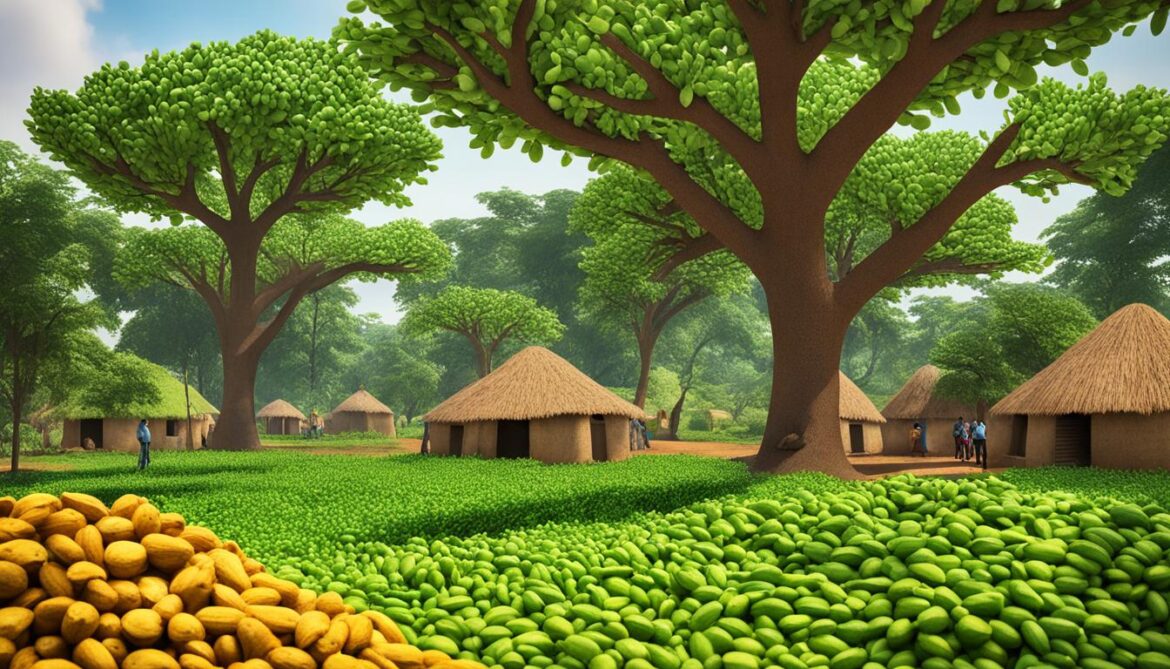
Economic and Environmental Benefits of Shea Nuts Value Addition
| Benefits |
Description |
| Increased income |
The value addition process provides a sustainable source of income for rural communities, particularly women. |
| Biodiversity conservation |
By promoting sustainable shea nut processing, deforestation is reduced, preserving the habitats of flora and fauna. |
| Eco-friendly alternatives |
Locally-produced shea butter offers organic and sustainable alternatives for industries such as cosmetics and skincare. |
| Preservation of cultural heritage |
The value addition to shea nuts preserves and celebrates the cultural significance of shea trees in Togo. |
The table above summarizes the economic and environmental benefits of shea nuts value addition. It highlights how this industry contributes to sustainable income generation, biodiversity conservation, the promotion of eco-friendly alternatives, and the preservation of Togolese cultural heritage.
Centre of Excellence for Technical Training
The Centre of Excellence for Technical Training in Togo plays a crucial role in shaping the future of sustainable architectural design. The curriculum focuses on equipping students with the knowledge and skills required to integrate energy-efficient practices into their designs and construction projects. The Centre of Excellence promotes sustainable practices and instills an ethos of energy efficiency in its students, ensuring that Togolese professionals are at the forefront of sustainable architecture and construction.
The Centre of Excellence for Technical Training offers a comprehensive range of courses and programs that cover various aspects of sustainable architecture education and green building design. Students receive training in renewable energy integration, sustainable materials and construction techniques, green building certification, and environmental impact assessment. These programs provide students with the necessary skills to address the environmental challenges of the built environment and drive positive change in the architectural industry.
The Centre of Excellence fosters a collaborative learning environment, encouraging students to explore innovative and sustainable solutions to design and construction challenges. Practical hands-on training allows students to apply their knowledge in real-world scenarios, developing a strong foundation in sustainable architectural principles.
Through partnerships with industry professionals and organizations, the Centre of Excellence provides students with valuable networking opportunities and access to the latest advancements in sustainable design and construction. This collaboration ensures that students stay up-to-date with industry trends and best practices, positioning them as leaders in the field of sustainable architecture.
Skills and Specializations
- Sustainable Architectural Design
- Renewable Energy Integration
- Green Building Certification
- Sustainable Materials and Construction Techniques
- Environmental Impact Assessment
Graduates from the Centre of Excellence for Technical Training possess the skills and knowledge needed to create buildings and structures that are energy-efficient, environmentally friendly, and socially responsible. These professionals play a vital role in shaping sustainable communities and driving positive change in the built environment.
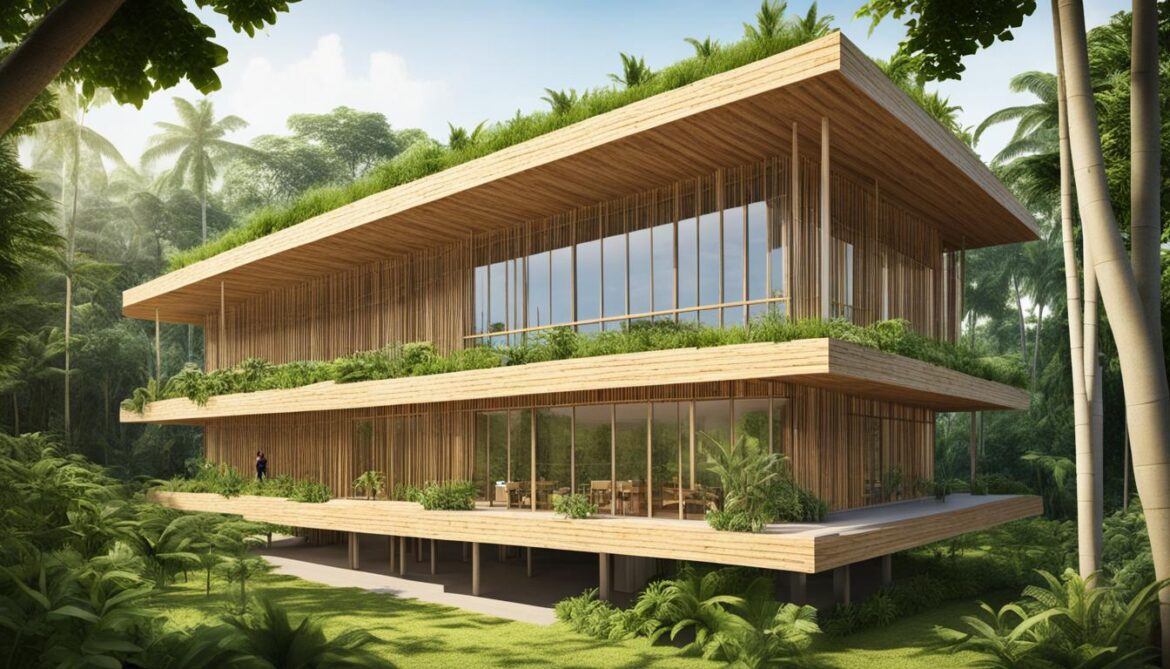
“The Centre of Excellence for Technical Training equips students with the necessary tools to create buildings that are not only aesthetically pleasing but also sustainable and energy-efficient. The curriculum focuses on cutting-edge design principles and construction techniques, ensuring graduates are well-prepared to tackle the challenges of the future.” – Architectural Digest
Skills and Specializations
The Centre of Excellence for Technical Training in Togo offers specialized programs to equip students with the knowledge and skills needed for sustainable architectural design. These programs focus on various areas of expertise, including:
- Energy-Efficient Building Design: Students learn to incorporate energy-saving strategies and technologies into their architectural designs to maximize efficiency and reduce environmental impact.
- Renewable Energy Integration: The curriculum emphasizes the integration of renewable energy sources, such as solar and wind power, into building design and implementation.
- Sustainable Materials and Construction Techniques: Students gain an understanding of sustainable building materials and construction methods that minimize resource consumption and waste generation.
- Green Building Certification: The programs cover the requirements and processes involved in obtaining green building certifications, such as LEED (Leadership in Energy and Environmental Design).
- Environmental Impact Assessment: Students acquire skills in assessing the potential environmental impact of architectural projects and developing mitigation strategies.
These specialized programs ensure that students acquire in-depth knowledge and expertise in their chosen field, enabling them to contribute to the sustainable development of Togo’s built environment. By combining theoretical knowledge with practical skills, graduates from the Centre of Excellence are equipped to design and implement innovative, sustainable architectural solutions that address the unique challenges of Togo.
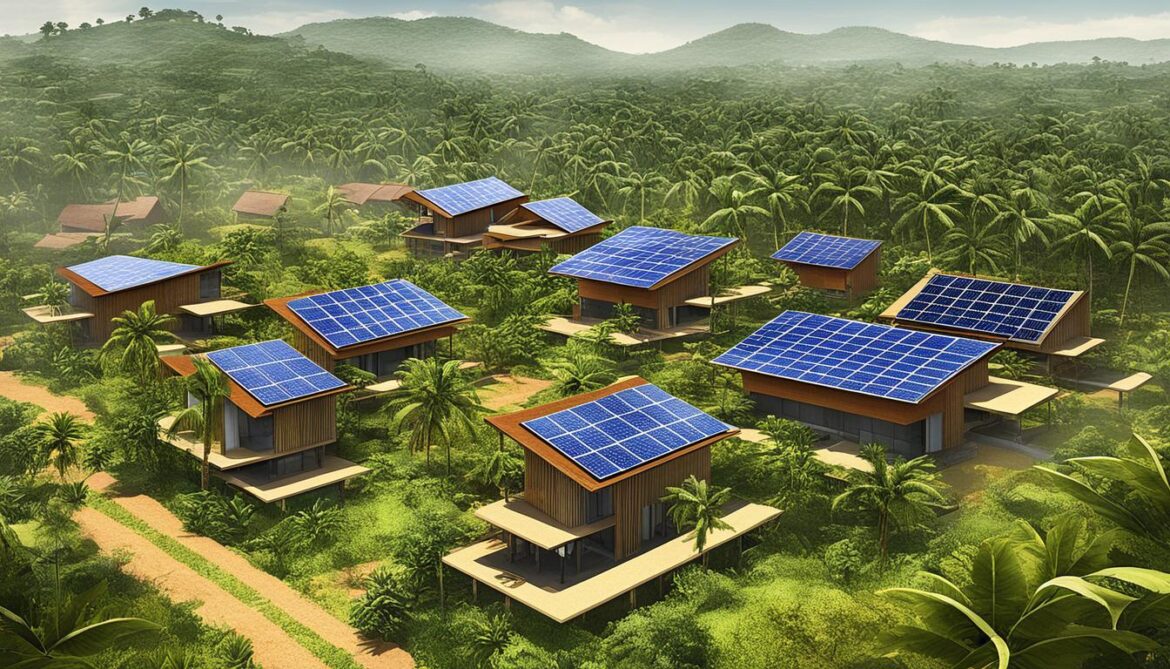
Testimonial from a Graduate: Jeanne Baudin
“The specialized programs at the Centre of Excellence have been instrumental in shaping my career in sustainable architectural design. I gained a deep understanding of energy-efficient practices, renewable energy integration, and sustainable materials, allowing me to create environmentally friendly and aesthetically pleasing buildings. The knowledge and skills I acquired enabled me to obtain green building certifications for my projects, demonstrating my commitment to sustainability. I am proud to contribute to the development of Togo’s built environment in an environmentally responsible manner.”
Employment Opportunities:
Graduates from the Centre of Excellence for Technical Training in Togo have access to a range of employment opportunities, including:
- Architects specializing in sustainable design
- Consultants for energy-efficient building projects
- Environmental impact assessors
- Green building certification assessors
- Research and development roles in sustainable architectural design
Future Outlook:
As Togo continues to prioritize sustainable development and green infrastructure, the demand for professionals with expertise in sustainable architectural design, renewable energy integration, and green building certification is expected to increase. The Centre of Excellence for Technical Training plays a crucial role in nurturing the next generation of professionals who will shape the future of Togo’s built environment.
| Skills |
Specializations |
Opportunities |
| Energy-Efficient Building Design |
Architects specializing in sustainable design |
Architects specializing in sustainable design |
| Renewable Energy Integration |
Consultants for energy-efficient building projects |
Consultants for energy-efficient building projects |
| Sustainable Materials and Construction Techniques |
Environmental impact assessors |
Environmental impact assessors |
| Green Building Certification |
Green building certification assessors |
Green building certification assessors |
| Environmental Impact Assessment |
Research and development roles in sustainable architectural design |
Research and development roles in sustainable architectural design |
Photovoltaic Solar Power Plant in Sokodé
Meridiam has signed a Concession Agreement with the Republic of Togo to construct a photovoltaic solar power plant in Sokodé. This plant will provide clean and renewable energy to over 700,000 people in Sokodé and surrounding rural towns, contributing to Togo’s goal of universal access to electricity by 2030. The project exemplifies Togo’s commitment to reducing carbon emissions and promoting sustainable energy practices.
Togo is actively embracing renewable energy sources to meet its growing electricity needs while reducing its reliance on fossil fuels. The development and implementation of a photovoltaic solar power plant in Sokodé aligns with Togo’s vision of transitioning to a clean energy future.
The solar power plant in Sokodé will harness the abundant sunshine in the region to generate electricity through photovoltaic technology. The plant’s installation will consist of solar panels that convert sunlight into electrical energy without producing greenhouse gas emissions or other harmful pollutants.
By investing in renewable energy infrastructure, Togo is positioning itself as a leader in sustainable development. The photovoltaic solar power plant in Sokodé will significantly contribute to the country’s efforts to combat climate change, reduce its carbon footprint, and improve air quality.
“The construction of the photovoltaic solar power plant in Sokodé is a significant milestone in Togo’s journey towards a sustainable and environmentally friendly energy sector. It demonstrates our commitment to clean energy and sets an example for other nations to follow.”
– Minister of Energy and Mines, Republic of Togo
The solar power plant’s benefits extend beyond environmental considerations. It will provide a reliable and sustainable source of electricity to the communities in Sokodé and surrounding areas, improving their quality of life and allowing for economic growth.
The implementation of the photovoltaic solar power plant also creates job opportunities, stimulating the local economy and fostering skill development in the renewable energy sector. Additionally, the project will serve as an educational platform, raising awareness about the benefits of clean energy and encouraging further investments in renewable infrastructure.
With the photovoltaic solar power plant in Sokodé, Togo is taking a significant step towards achieving its renewable energy goals. The project not only enhances the country’s energy security but also reduces its reliance on imported fossil fuels, leading to greater energy independence.
The photovoltaic solar power plant in Sokodé demonstrates Togo’s commitment to clean energy and sustainable development. Through strategic investments in renewable infrastructure, Togo is paving the way for a greener and more sustainable future.
Advantages of the Photovoltaic Solar Power Plant in Sokodé
| Advantages |
Description |
| Renewable Energy Generation |
The solar power plant harnesses the sun’s energy to produce electricity, ensuring a sustainable and renewable energy supply. |
| Reduced Carbon Emissions |
By generating electricity from solar energy, the plant significantly reduces greenhouse gas emissions, contributing to Togo’s climate change mitigation efforts. |
| Improved Energy Access |
The solar power plant provides electricity to over 700,000 people in Sokodé and surrounding areas, improving energy access and stimulating socio-economic development. |
| Job Creation |
The construction and operation of the solar power plant create job opportunities, boosting local employment and fostering skill development in the renewable energy sector. |
| Economic Growth |
Access to reliable and sustainable electricity supports economic growth and enhances the living conditions of communities in Sokodé and surrounding rural towns. |
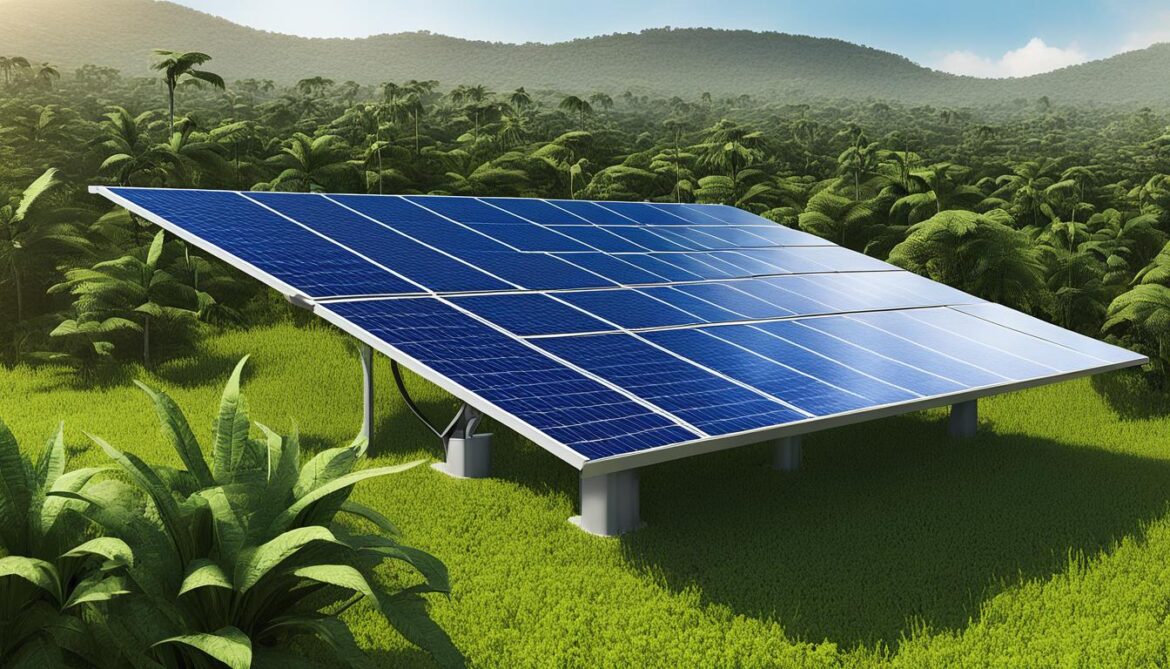
The photovoltaic solar power plant in Sokodé is a transformative project that exemplifies Togo’s commitment to renewable energy and sustainable development. It serves as a shining example of how Togo is harnessing its natural resources to meet its energy needs while reducing its environmental impact.
Conclusion
Togo’s biodiversity is a significant asset that necessitates dedicated conservation efforts to foster sustainable development. The country’s remarkable array of flora and fauna contributes substantially to the well-being of local communities and the economy. By embracing initiatives focused on sustainable architecture, eco-friendly construction practices, and renewable energy, Togo is actively shaping a greener and more sustainable future.
By prioritising biodiversity conservation and integrating sustainable design principles, Togo can strike a harmonious balance between its built environment and the natural world. This approach will help create a society that is more resilient, sustainable, and attuned to its surroundings. With each step taken towards preserving Togo’s biodiversity, the nation moves closer to achieving its goals of sustainable development.
Through the continued implementation of green infrastructure and sustainable practices, Togo has the potential to lead by example in environmental stewardship. By safeguarding its rich biodiversity, Togo can unlock countless economic and social opportunities while preserving its natural heritage for future generations. The collective efforts made towards biodiversity conservation, sustainable development, and the integration of green infrastructure position Togo as a trailblazer in the pursuit of a sustainable and green future.
FAQ
What is the importance of Togo’s biodiversity in the built environment?
Togo’s biodiversity plays a crucial role in the built environment by providing various benefits, including food products, raw materials, and sociocultural significance. It contributes to food security, traditional pharmacopeia, and sustainable construction practices.
What are Togo’s terrestrial flora and aquatic species?
Togo’s terrestrial flora includes flowering plants, tropical fruits, medicinal herbs, orchids, grasses, and ferns. Its aquatic ecosystem is home to a variety of fish, amphibians, crustaceans, waterbirds, and aquatic plants.
What efforts are being made to conserve Togo’s biodiversity?
Conservation efforts in Togo include research, habitat protection, and the preservation of endangered species. The country aims to achieve the Aichi Biodiversity Targets and ensure the sustainable management of its natural resources.
How does forest fragmentation affect biodiversity in Togo?
Forest fragmentation disrupts habitats, limits resources, and impedes the movement and reproduction of wildlife. It contributes to the decline of species, reduces food and shelter availability, and poses a threat to biodiversity in Togo.
What benefits does Togo’s biodiversity provide?
Togo’s biodiversity offers a wide range of benefits, including food security, raw materials for industry, and sociocultural significance. Indigenous crops, wild edibles, timber, and medicinal plants contribute to a diverse diet, traditional practices, and economic opportunities.
How does beekeeping contribute to sustainable architecture in Togo?
Beekeeping supports sustainable livelihoods by preserving local biodiversity, promoting eco-friendly practices, and reducing conflicts between settlements and wildlife. It contributes to sustainable design and construction by generating income through honey production.
What is the value addition to shea nuts and its impact on Togo’s biodiversity?
Processing shea nuts into products such as shea butter creates sustainable income opportunities while preserving the local ecosystem. It empowers women, reduces deforestation, and promotes sustainable design and construction practices in Togo.
How does the Centre of Excellence for Technical Training shape sustainable architectural design in Togo?
The Centre equips students with the knowledge and skills to integrate energy-efficient practices into their designs and construction projects. It promotes sustainable practices, ensuring that Togolese professionals lead in sustainable architecture and construction.
What skills and specializations are offered in Togo’s Centre of Excellence?
The Centre offers specialized programs in energy-efficient building design, renewable energy integration, sustainable materials and construction techniques, green building certification, and environmental impact assessment.
What is the significance of the photovoltaic solar power plant in Sokodé?
The solar power plant provides clean and renewable energy to over 700,000 people in Sokodé and surrounding rural towns. It contributes to Togo’s goal of universal access to electricity by 2030, reducing carbon emissions and promoting sustainable energy practices.
How does Togo prioritize biodiversity conservation and sustainable development?
Togo recognizes the importance of biodiversity conservation and incorporates sustainable design principles in its built environment. By harmonizing the natural world with urban development, Togo aims to create a more sustainable and resilient society.
Source Links


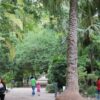











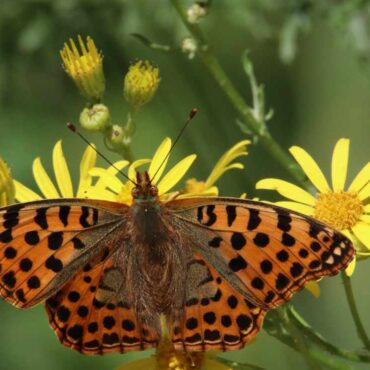
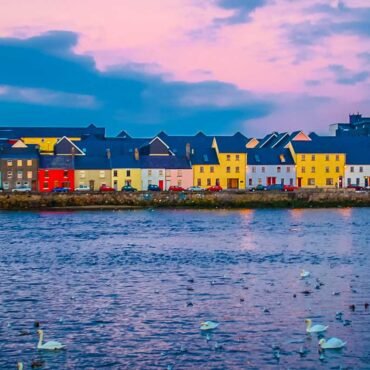









Post comments (0)